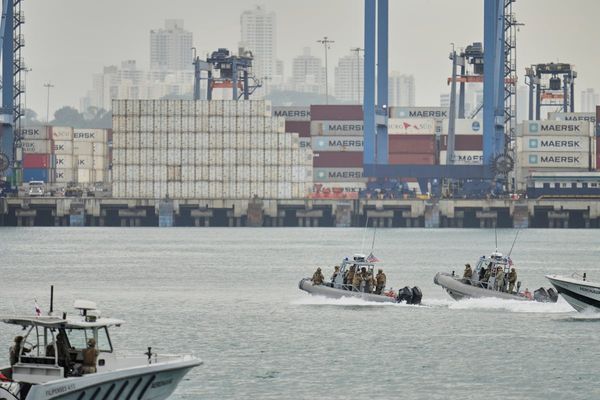
The whole of Ireland was put on red alert on Thursday as Storm Éowyn barrelled in from the north Atlantic. Schools in the Irish republic are closed on Friday, all public transport has been stood down and pet owners have been told to keep animals stabled or indoors, with 80mph winds expected to leave trails of destruction before the storm moves on towards central Scotland.
The danger to life and property will be more than enough for most people in Ireland. But it is hard not to see this week’s tempestuous visitation as something of a metaphor for Irish politics, which have had an unusually storm-tossed week of their own as the republic buckles up for a tax-and-tariff battle with Donald Trump’s new administration in Washington.
Ireland’s November 2024 general election bucked the global trend of anti-incumbency voting. The two main centre-right coalition parties, Fianna Fáil and Fine Gael, which had governed together since 2020, were re-elected. Their main rival, Sinn Féin, fell back. Together, Fianna Fáil and Fine Gael came just short of an overall majority in the Dáil. Dublin politics over the new year have focused on putting together a confidence-and-supply deal to give the coalition a new parliamentary mandate.
The two parties thought they had done that deal earlier this month by securing the support of a group of independents. On Wednesday, the new government duly came to the Dáil to get authorisation for Fianna Fáil’s Michéal Martin to be installed once more as taoiseach (Fine Gael’s leader, currently Simon Harris, is scheduled to take over in 2027). But at this point it all went horribly wrong.
The coalition plan was met with fury, with opposition parties apparently outraged that the new Dáil speaker was allowing four independents to sit on the opposition benches with more speaking rights than they would have had on the government side. The house was suspended multiple times as members barracked one another over the meaning of obscure Dáil standing orders. It was an embarrassing moment for the Irish parliament, and not much better for politics generally.
It only took until lunchtime on Thursday to sort out a sensible compromise. This allowed Mr Martin to finally receive his seal of office, and the keys to the taoiseach’s officeon Thursday, while Dáil lawyers work on the standing orders over the coming days. It is unlikely – though never say never – that Wednesday’s commotion will be repeated. But it was a messy start to the retread coalition’s life.
It does not help that these spats have occurred while Mr Trump threatens to place sanctions on the European Union over its digital policies. These could trigger the repatriation of Irish jobs and, especially, of taxes paid by US multinationals whose European arms are headquartered in Ireland, lured there by Dublin’s low corporate tax regime. These taxes, paid by the likes of Apple, Microsoft, Meta and X, some of whose CEOs have cosied up to Mr Trump, have helped fuel a boom in Irish public finances that helped the coalition parties get re-elected. Ireland’s government may look like a stable outlier in an increasingly volatile EU. But damaging storms may not be far away.







